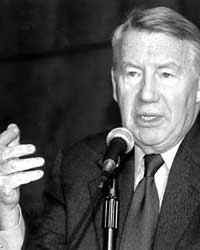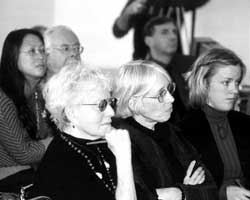 Artists, Innovators,
and Teachers Hold “Imagination Conversation” at
Lincoln Center Institute
Artists, Innovators,
and Teachers Hold “Imagination Conversation” at
Lincoln Center Institute
by Marie Holmes
Do schools suffer a lack of imagination?
The audience full of teachers and
other education professionals in attendance at a panel discussion
entitled “Imagination
Conversation,” held recently by the Lincoln Center Institute,
likely rely upon their own imaginative powers every day.
Yet at the end of a lengthy discussion
about the elusive nature of the human imagination and its
various applications, the illustrious panelists—Natalie Angier, Shelly Lazarus,
Reynold Levy, Winston Lord, Anna Deavere Smith and moderator
Robert MacNeil—were in agreement that one sector of society
seriously lacking in imagination is education, specifically,
the policy side of education.
The “Conversation,” one of numerous discussions
taking place throughout the country in the past few months,
was designed to bring together thinkers, artists, scientists,
scholars, businesspeople and educators to talk about their
conceptions of the imagination, how their imaginations have
influenced their lives and career paths, and how schools might
do a better job of fostering the imaginative capacities of
their students. Maxine Greene, Professor Emeritus at Columbia
Teacher’s College and the Institute’s “philosopher-in-residence,” responded
to the panelists’ comments.
MacNeil, of PBS’ MacNeil-Lehrer NewsHour, posited the
nature versus nurture question, positioning himself squarely
on the side of genetic determinism. Natalie Angier, award-winning
science writer and author of Woman: An Intimate Geography,
responded that she disagreed, to a certain point, saying, “I
think that there are ways to teach people to think creatively
and I think we should do more of that.” Angier noted
that even more traditional teaching methods that rely on memorization
and paradigms, such as English grammar or the scientific method,
can foster student creativity. “If you . . . have this
algorithm it really liberates you,” she explained.
 Winston Lord, Ambassador and Co-Chair of the International
Rescue Committee, said he did not believe that the Foreign
Service rewarded imaginative thinking in its employees. Some
of the most celebrated, as well as the most regrettable, chapters
in this history of international relations, Lord noted, could
be characterized as acts of imagination, from the efforts to
rebuild Europe after World War II to the Domino theory of Communist
takeover in Asia that supplied a justification for the war
in Vietnam.
Winston Lord, Ambassador and Co-Chair of the International
Rescue Committee, said he did not believe that the Foreign
Service rewarded imaginative thinking in its employees. Some
of the most celebrated, as well as the most regrettable, chapters
in this history of international relations, Lord noted, could
be characterized as acts of imagination, from the efforts to
rebuild Europe after World War II to the Domino theory of Communist
takeover in Asia that supplied a justification for the war
in Vietnam.
The playwright Anna Deavere Smith
suggested that when people talk about the imagination, they
sometimes appear to be talking about a rare gift, even though “it’s clear that
everyone has an imagination—It’d be interesting
to meet someone who didn’t have one.” A challenge
for educators, Deavere Smith and other panelists concurred,
is to impart students with an understanding of the rigor that
all creative efforts command. “Any imaginative energy
has to be accompanied by rigor,” said Deavere Smith. “I
don’t think I’d say that some people have more
imagination than others. I think it’s more about what
you can make with your imagination.”
Shelly Lazarus, Chairman and CEO
of Ogilvy and Mather Worldwide, elicited agreeing nods from
panelists and audience members alike when she said, “if we ever needed imaginative problem-solving
it might be now.” Such intensive, imaginative efforts
present our best hope of remedy for failing schools and school
systems, Lazarus suggested. Her own daughter, she said, had
recently left her Teach for America classroom assignment out
of frustration with high-stakes testing, Lazarus reported.
Maxine Greene offered her thoughts on the subject of the imagination,
offering hope by assuring those present that they were not
the first generation to reckon with tough questions in times
of turmoil.
Teachers that spoke following the
panel discussion appeared to share the speakers’ concern for their students’ academic
and creative futures. One teacher commented that it was comforting
to hear the panelists reinforce the idea of multiple intelligences,
albeit in different language, over the course of their discussion.#
